Northern Ireland Perspectives
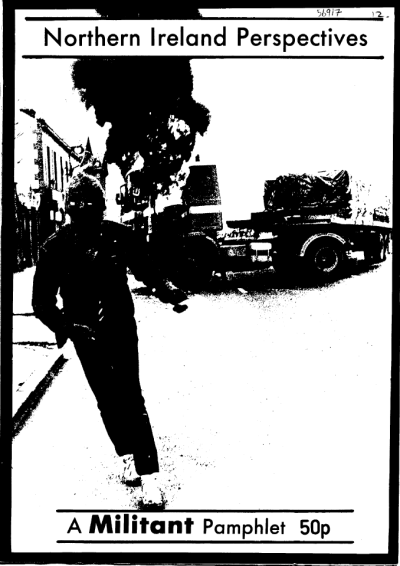
| Date: | 1988 |
|---|---|
| Organisation: | Militant |
| Author: | Peter Hadden |
| View: | View Document |
| Discuss: | Comments on this document |
| Subjects: |
Please note: The Irish Left Archive is provided as a non-commercial historical resource, open to all, and has reproduced this document as an accessible digital reference. Copyright remains with its original authors. If used on other sites, we would appreciate a link back and reference to The Irish Left Archive, in addition to the original creators. For re-publication, commercial, or other uses, please contact the original owners. If documents provided to The Irish Left Archive have been created for or added to other online archives, please inform us so sources can be credited.
Commentary From The Cedar Lounge Revolution
24th June 2013
The text of this document is available here, but as always the idea is to present not only the text of a document but a copy of it as it was published (and also to have as wide a sampling of documentation in the Archive as is possible).
On Marxists.org it is noted that Peter Hadden wrote this and most other documents relating to Northern Ireland. Ten pages long and written in the wake of the Anglo-Irish Agreement interestingly the Introduction focuses very strongly on the situation in Britain:
That the Tories could win a third consecutive term, despite their reactionary policies, is a searing indictment of the role of the right-wing Labour and trade union leaders over recent years. The fact that these leaders moved to the right, abandoned left and socialist policies, and distanced themselves from the struggles of the miners, print unions, Liverpool Council and others, allowed the Tories to go to the country with a significant lead in the opinion polls. During the campaign Kinnock and his right-wing handlers singularly failed to present any socialist alternative to the Tories. They relied on slick presentation which was all form and no content. The right-wing argument that socialist ideas lose votes was definitively answered by the result. According to the right, Labour fought a brilliant campaign – yet they lost moreover in those areas where the campaign and candidate were most closely associated with the right wing Labour generally got the worst result. Bryan Gould, the party’s campaign manager, managed to produce a 8.3% swing to the Tories in his own seat.
And continues:
Compare this with the achievement of four Militant supporters who fought on a clear socialist programme: Pat Wall – 9.9% swing from the SDP in Bradford North; Dave Nellist – 5.3% swing to Labour from the Tories in Coventry SE; John Bryan – 3.6% Liberal to Labour swing in Bermondsey (overall in London there was a 0.5% swing from Labour to the Tories); and Terry Fields who produced a 12.4% swing from the Tories and almost doubled his majority in Liverpool Broadgreen. The Tories won because of the failure of the Labour leaders and because they were able to partially disguise the real depths of the economic malaise which afflicts British capitalism. The election took place in the latter period of the current shaky boom in the world economy. Looming on the horizon is the prospect of a new recession at a certain stage. This Tory government, with its programme of further assaults on living standards and services will be confronted by huge movements of the working class.
And concludes in relation to this:
Even now, in this period of “boom” there has been an up-turn in the class struggle as workers have moved to demand their share of the fruits of economic growth. Defeated on the political front the working class will now have no choice but to turn to the industrial front.
In relation to Northern Ireland it suggests:
These struggles will leave their mark within the unions and within the Labour Party as workers attempt to push their organisations to the left. What has already taken place within the CPSA and the NCU is a harbinger of future developments within the labour movement as a whole. Despite the conflicting factor of sectarianism the same processes are at work in the North. The Anglo-Irish Agreement is less of a central issue than at the time this document was written. The opposition of the mass of Protestants to the accord has in no way abated. But, as the Marxists predicted in advance, the Agreement in reality has proved inoperable and has not been implemented. During the first six months of 1987 the previously much vaunted Anglo-Irish Conference has met on a grand total of two occasions! Nothing of note has come from these meetings.
And that:
Moreover the British government has been at pains to appease the Unionists. The Anglo-Irish Agreement is no longer presented as an historic breakthrough or as the basis for the final solution of the Irish question. Northern Ireland Tory spokesmen now talk of the Agreement remaining in place until something better can be negotiated. Again, as the Marxists predicted at the outset, far from concessions, the pact has produced increased repression in the Catholic areas. Loughgall not Hillsborough is the watchword of the present policy of the ruling class. Despite the opening of the talks between the Unionists and government any way out of the current political impasse is as far away as ever. It cannot be too often emphasized that no solution is possible on a capitalist basis. Even given the relative downturn in the level of sectarian violence the situation remains explosive. The breakdown of talks, the loyalist assassination campaign and the deliberately provocative escalation of the Provos’ campaign are all factors which could flip the scales in the direction of renewed sectarian bloodletting.
On a more positive note it argues that:
Nonetheless the mood of the mass of workers, Catholic and Protestant is not at present in favour of sectarian conflict. As sectarian issues have receded class issues have come to the fore. As in Britain the period immediately before and after the election has seen a sharp up-turn in the class struggle, significant strikes – by civil servants, teachers, Telecom workers, in the shipyard, in Shorts, the meat plants and in other workplaces – have taken place. Even bigger movements of the working class and of the youth are likely in the short term, but certain at some stage in the life of this government. So, paradoxically, the election defeat in Britain can act as a powerful spur to the industrial movement of the working class in the North.
And continues:
Just as the sectarian reaction of the past eighteen months unfolded in an uneven manner, so the development of the class movement will be likewise uneven. But excluding major developments which can throw things back, the most likely general line of development will be to the left. In this context the previous perspectives of the Marxists, temporarily cut across by the Anglo-Irish Agreement, for a transformation and re-transformation of the unions and the creation of a Labour Party at a certain stage, will tend to be borne out. The analysis and programme of Militant have been graphically confirmed and re-confirmed by recent events. Only on the basis of the socialist ideas we put forward can there be a way out for the working class. We have proved our ability to retain and develop these ideas under unfavourable conditions. Now events are beginning to move in our favour. The challenge now is to seize the opportunities which will present themselves and develop Marxism into a mass force among the working class.
The main bulk of the document goes into greater detail, not least in an analysis as to the rationale behind the Anglo-Irish Agreement which suggests that:
Thatcher’s handling of the 1981 hunger strikes won her government a pyrrhic victory. The prisoners were defeated but at the cost of the alienation of the Catholic population. Thatcher’s unnecessary, and, from a bourgeois point of view, stupid intransigence provided Sinn Fein with its electoral base. The hold, even the existence, of the SDLP was threatened. The Anglo-Irish Agreement was an attempt to put this right by isolating the Provos and boosting the SDLP. On every count it has been a gross miscalculation. Trying to correct one mistake the ruling class have merely compounded it with another. The problem of the minority remains unresolved but is now added to by the even bigger problem of the majority. The roots of this miscalculation lie in the government’s false estimation of the Protestant reaction to the accord. Thatcher’s original conception that the mass of Protestants would come to see the Agreement as no threat to them lies in ruins. Because of the ham-fisted manner of its introduction and because it appears to go further than it does, it has aroused such a fierce Protestant opposition that the entire thing is and will remain completely inoperable.
It is however notable how pessimistic the tone is at times:
Paisley and more particularly the “young Turks” within the DUP have been permitted to move centre stage. Future mass loyalist reaction, should it develop, would crystallise around such people. It would encompass hardliners in both Unionist parties, groups like the Ulster Clubs, the UDR ranks, and in its ultimate stages, the RUC also. The loyalist paramilitaries would be brought into tow of such a movement providing its physical force battalions. Reaction has not reached such a stage. So the “armies” formed by Paisley retain, even now, an evanescent character, yet they are not to be dismissed. Such forces are a quite serious threat in the short term. Actions such as the sealing off of villages could precipitate pogroms. Were the Anglo-Irish Agreement to be implemented these forces could swell and become a vehicle for armed reaction. They give a glimpse of what will happen in the long term if the labour movement does not provide a socialist way out for the mass of Protestant and Catholic workers.
In sum a most interesting document in relation to the views of Militant during this particular period.
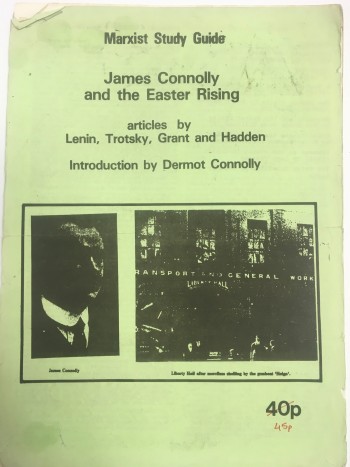
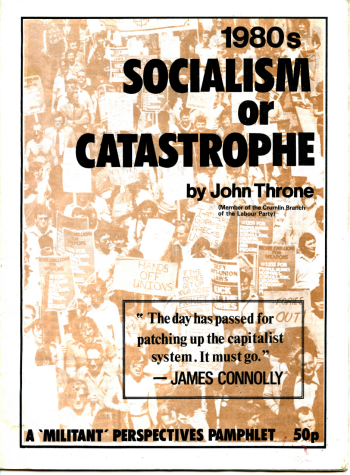
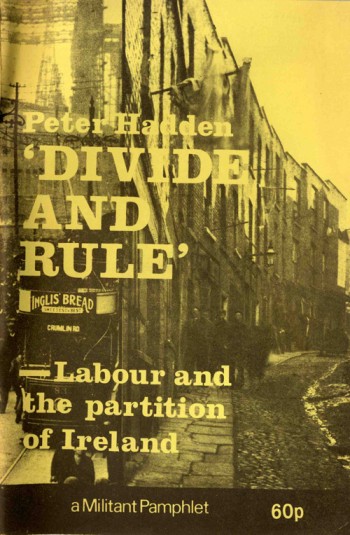
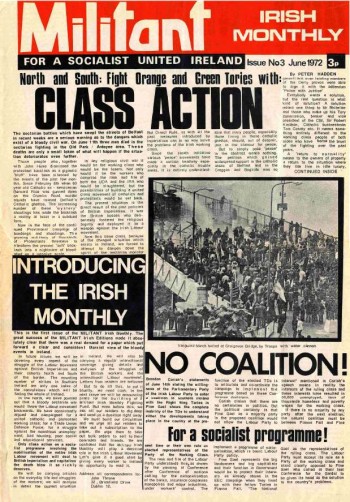
Comments
No Comments yet.
Add a Comment
Comments can be formatted in Markdown format . Use the toolbar to apply the correct syntax to your comment. The basic formats are:
**Bold text**
Bold text
_Italic text_
Italic text
[A link](http://www.example.com)
A link
You can join this discussion on The Cedar Lounge Revolution
By: Pangur ban Wed, 26 Jun 2013 07:22:11
In reply to Jolly Red Giant.
It depends on how you view merrigans perception .
He obviously bracketed on the basis of anti nationalism.
But you could argue that as both OSF/WP and militant argued for some form of armed militias they could be bracketed together
Reply on the CLR
By: Paddy Healy Wed, 26 Jun 2013 08:49:33
It is often better to look at what people do rather than what they say in order to determine their positions. As National Secretary of the H-Block Trade Union Committee, it was my duty to organise work stoppages in support of the prisoners’ demands. These stoppages were numerous and became extensive after the death of Bobby Sands. All left wing groups except SP, WP ad DSP assisted in this work. Many who were opposed to the IRA campaign took part.
My understanding of the SP position is that they see Irish Unity as a CONSEQUENCE of a “pure” socialist revolution. In this they differ from Connolly who saw the struggle for Irish unity as a key component of the struggle for socialism. “The cause of Ireland is the cause of Labour and the cause of Labour is the cause of Irelad”
Reply on the CLR
By: Jolly Red Giant Wed, 26 Jun 2013 11:37:02
The Socialist Party did not participate in the H-Block Trade Union Committee because it supported republicanism. Most of the left-groups and grouplets in this country have always coat-tailed the republican movement.
The Militant was the only group in the North (and the South) that promoted the five demands of the prisoners in a non-sectarian fashion and succeeded in getting motions supporting these demands passed through trade unions in the North (most significantly NIPSA) while left groups affiliated to the H-Block Trade Union Committee succeeded in doing nothing but stoking division and sectarianism in the trade unions in the North.
As for your understanding of the Socialist Party’s position on Irish Unity – you are as far off base now as you were 30 years ago.
Reply on the CLR
By: Jolly Red Giant Wed, 26 Jun 2013 11:37:44
In reply to Jolly Red Giant.
Sorry P. ban – you will be wrong in your argument there again.
Reply on the CLR
By: NollaigO Thu, 27 Jun 2013 07:57:05
In reply to Jolly Red Giant.
“Take the major finance houses and the 500 largest companies into public ownership and place them under the democratic control and management of the working class.“.
I have not found the reference to the 250. I may have got the exact number wrong but that is not the substantive point.
The above reference from the document linked to in dilettante’s reference below supports my point. It’s contained in the “in the north” section only of “What We Stand For” and typifies the essentially Walkerite / Unionist outlook of that group.
Reply on the CLR
By: Paddy Healy Thu, 27 Jun 2013 11:29:35
There is nothing “sectarian” in seeking support for political status for republican prisoners and nothing “sectarian” about seeking such support from trade union bodies.
The position of Militant/SP on Irish unity is set out in the Hadden documents which are referenced by Dilettante:
“The reasons which caused us to drop ‘a socialist united Ireland’ as a slogan during the 1980s are even more powerfully valid today. Protestant workers see in this only the ‘united’, not the ‘socialist’. Posed thus baldly it would be a barrier to explanation, not a bridge.
We have been putting forward the alternative formulation ‘for a socialist Ireland and a socialist federation of Britain and Ireland’. This remains the best way of presenting our ideas. The slogan is sufficiently open not to lead to mistaken interpretations, it is sufficiently removed from republican formulations not to immediately trigger Protestant sensitivities. It emphasises the need for socialism before it raises the specific nature of a socialist state in Ireland. Thus it points to the need to change society, not just remove a line from the map.”
Not alone is Militant/SP not unconditionally calling for a united Ireland as Connolly did, it has dropped even the slogan of “a socialist united Ireland”. The capitualtion to reactionary loyalism is clear.
Reply on the CLR
By: how to build a gaming pc Tue, 15 Apr 2014 02:02:56
Hurrah, that’s what I was seeking for, what a information!
present here at this webpage, thanks admin of this site.
Reply on the CLR